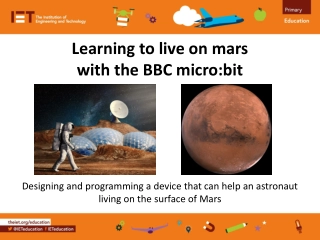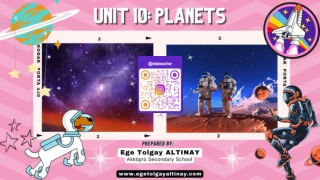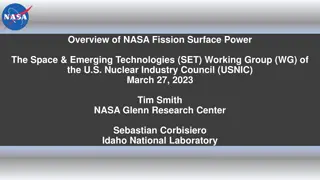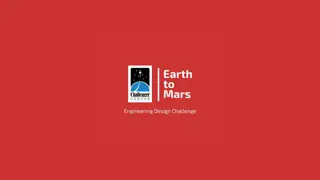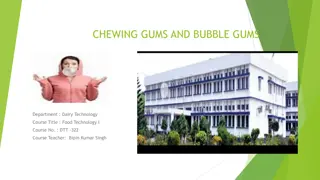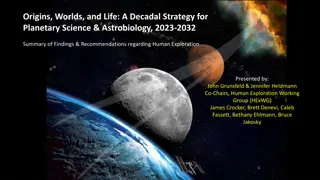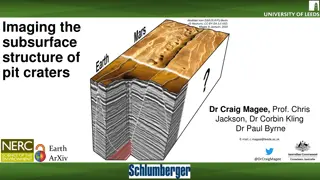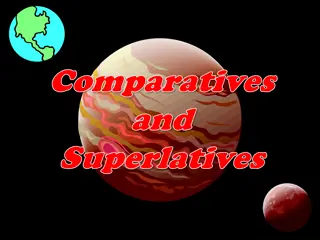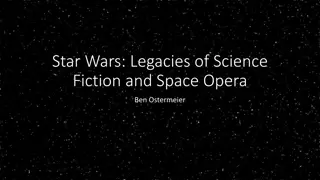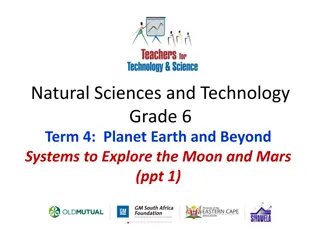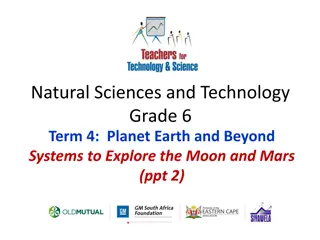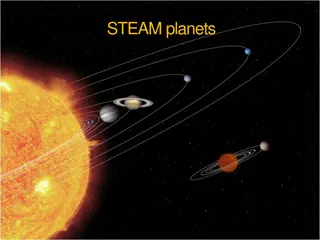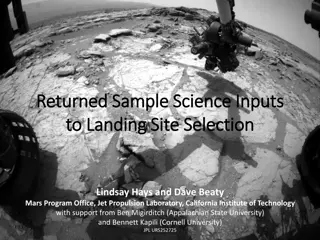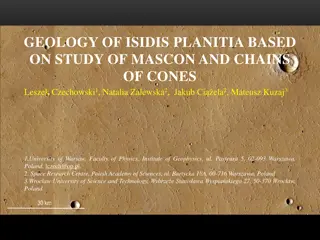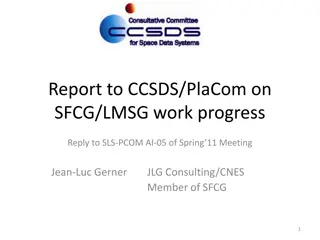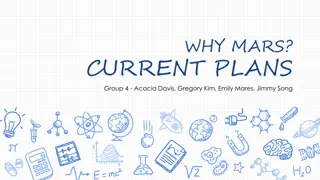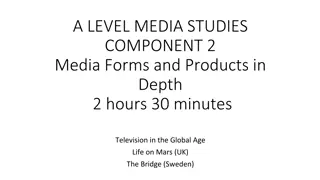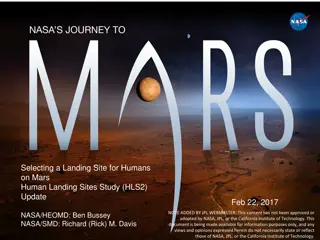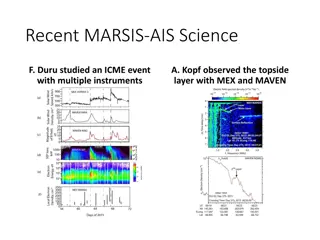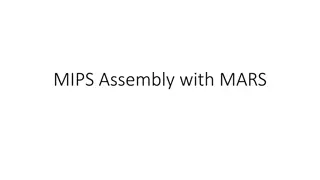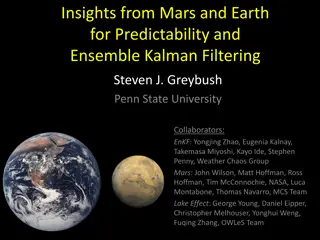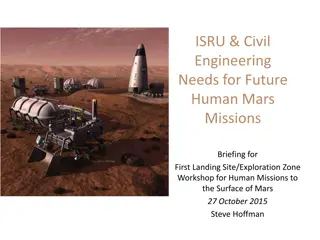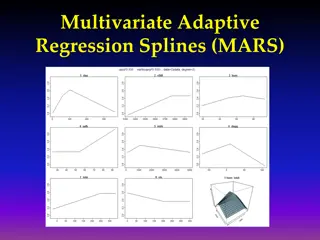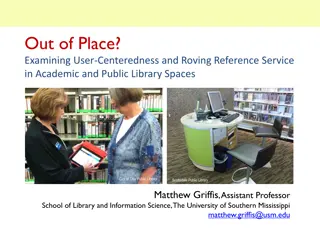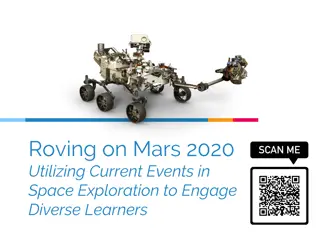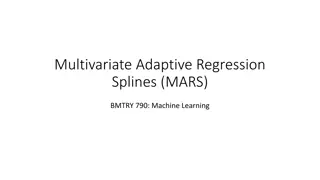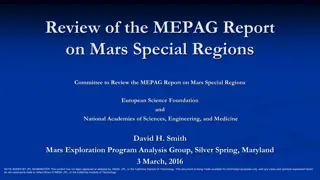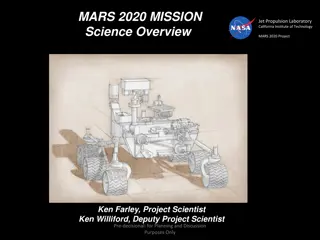Mars Exploration with BBC micro:bit
Design and program a device to aid Mars astronauts in data collection and oxygen tracking. Understand Mars's environment for survival. Explore the design brief and criteria to create a functional tool for space exploration. Popular
1 views • 19 slides
The 8 Planets in Our Solar System and More
Discover the 8 planets in our solar system - Jupiter, Earth, Uranus, Mercury, Sun, Mars, Venus, Neptune - plus dwarf planet Pluto. Explore space-related words and images in this educational content.
11 views • 41 slides
PDF/READ❤ The First City on Mars: An Urban Planner’s Guide to Settling the Red
\"COPY LINK HERE ; https:\/\/getpdf.readbooks.link\/B0BSSTGD68\n\n[PDF READ ONLINE] The First City on Mars: An Urban Planner\u2019s Guide to Settling the Red Planet (Springer Praxis Books) | The First City on Mars: An Urban Planner\u2019s Guide to Settling the Red Planet (Springer Praxis Books)\n\"\
0 views • 6 slides
National Aeronautics and Space Administration Moon-to-Mars Strategy Update
Evolving projects, timelines, and architectural updates of the National Aeronautics and Space Administration's Moon-to-Mars strategy are discussed in detail, highlighting objectives, architecture components, analytical capabilities, and future segments. The strategy aims to achieve constancy of purp
3 views • 16 slides
Hold Down and Release Mechanism Hardware Simulator for Ground Deployment Testing
The project involves developing a hardware simulator for testing a Hold Down and Release Mechanism used in Mars Sample Return missions. The simulator aims to replicate the functionality of expensive flight hardware at a lower cost and with reduced lead time. Key requirements include precise activati
3 views • 8 slides
Latest Updates on NASA Mars Exploration Programs
Discover the latest developments in NASA's Mars Exploration Program, including highlights from the Curiosity rover, upcoming events, future planning activities, and progress on the Rosalind Franklin Mission collaboration with ESA. Get insights on community engagement, technology studies, industry in
1 views • 15 slides
NASA Fission Surface Power Overview: Enabling Sustainable Exploration of Moon and Mars
NASA's Fission Surface Power systems are pivotal for enabling sustainable energy production on the Moon and Mars, essential for human and scientific exploration missions. These nuclear power systems offer robust and continuous power in challenging environmental conditions, making them vital for supp
2 views • 11 slides
Designing a Sustainable Mars Habitat for Long-term Crew Stay
Design a Mars habitat for the first human crew that will be staying on Mars for several years. The habitat must include essential components such as sleeping quarters, restroom, exercise room, radiation shielding, food/water supply, entertainment, and ISRU technologies. Teams will research, create a
0 views • 7 slides
Chewing Gums and Bubble Gums in Dairy Technology - An Overview
Chewing gum and bubble gum are popular confectionery products made with specific ingredients such as gum base, sweeteners, flavors, and colors. These gums have distinct characteristics and are produced by major companies like Arcor Group and Mars, Incorporated. The role of ingredients like hydrocoll
1 views • 24 slides
Exploration Strategy for Planetary Science & Astrobiology 2023-2032
The decadal strategy outlines a comprehensive plan for planetary science and astrobiology, emphasizing the integration of human exploration activities with scientific objectives. Key elements include leveraging planned human space missions for new scientific opportunities and identifying areas of pl
9 views • 10 slides
Exploring Subsurface Structures of Pit Craters Through Seismic Reflection
Discover the technique of seismic reflection imaging to unveil the subsurface structures of pit craters on Earth and Mars. Follow the analysis of seismic data to map pit craters and their connections to geological features like dykes and fault jogs, shedding light on the formation processes of these
0 views • 11 slides
Fun Facts About the Solar System and Planets
Explore interesting comparisons between celestial bodies in our Solar System. Images and descriptions highlight the size, temperature, distance, and other unique characteristics of planets like Jupiter, Mars, Earth, Saturn, Neptune, Mercury, Venus, and more. Learn fascinating facts about these cosmi
0 views • 12 slides
Influential Works in Science Fiction and Space Opera Literature
Explore the significant influence of classic science fiction novels like "War of the Worlds," "A Fighting Man of Mars," "Second Foundation," "2001: A Space Odyssey," and "Children of Dune" on the creation of iconic space opera narratives such as Star Wars. Delve into the themes, settings, and charac
0 views • 16 slides
Decade of Governance in Malawi: A Deep Dive into Public Finance Mismanagement
Explore a critical analysis of governance in Malawi from 2010 to 2020, focusing on the pervasive issue of public finance mismanagement. Uncover insights into the metaphor of roving banditry in relation to public financial management (PFM) and its consequences. Delve into the challenges faced by the
0 views • 23 slides
Quality Control Measures in Yarn Production Process
Explore detailed images showcasing quality control steps in yarn production mill, including spinning preparation, drawing, blending, combing, roving, and spinning processes. Learn about sliver mass control, variation in weight per unit length, and Nep number control for ensuring high-quality yarn pr
1 views • 6 slides
Exploring Moon and Mars: Spacesuits Evolution
Astronauts wear spacesuits to survive in space by providing air to breathe, protection from extreme temperatures, and rocket-powered mobility. The evolution of spacesuits from bulky, stiff designs to modern, functional suits with advanced features is crucial for space exploration.
0 views • 11 slides
Exploration of the Moon: Vehicles and Tools Used in Grade 6 Natural Sciences and Technology
Explore the fascinating systems involved in investigating the Moon and Mars, focusing on the vehicles and tools used during exploration. Learn about the Lunar Rover, its specifications, and the tools astronauts utilized to collect rock samples on the Moon. Discover the challenges faced during the ea
3 views • 8 slides
Fun with Weight: Exploring Gravity Across Different Planets
Explore the concept of weight and gravity by comparing how objects weigh differently on Earth, Mars, the Moon, Jupiter, and Saturn. Learn about fractions to estimate weight changes and discover how gravity influences weight variations on different planets and celestial bodies. Get ready for an engag
0 views • 6 slides
Insights into Mars Sample Return Science Inputs for Landing Site Selection
The Mars Program Office at Jet Propulsion Laboratory has conducted a systematic survey to determine landing site priorities for sample return missions. Insights from the astrobiology and cosmochemistry/petrology communities reveal key interests such as geologic age, rock-water interactions, and dive
0 views • 16 slides
Geology of Isidis Planitia: Study of Mascon and Cones
Study explores surface structures and geological history of Isidis Planitia on Mars within a large impact basin. Focus is on origin of cones and chains of cones to better understand Mars' regions. Utilizes analysis of surface structures and deep structures like mascon for insights.
0 views • 15 slides
Myth of Romulus and Remus: From Founding Rome to the Rape of the Sabine Women
Romulus and Remus, twin sons of the god Mars, founded Rome after being raised by a she-wolf. Their story includes betrayals, raids, and the infamous Rape of the Sabine Women to secure wives for their growing population. The tale intertwines mythology and history in the founding of the Roman civiliza
0 views • 6 slides
Progress Report on Lunar-Mars Spectrum Group Work within SFCG
The Lunar-Mars Spectrum Group (LMSG) met to review important input documents related to lunar communications, including compatibility studies, frequency considerations, and frequency assignment guidelines. The group identified the need for further work to refine proposed reports and agreed on new ac
0 views • 17 slides
Current Mars Missions and Future Plans
Mars currently has 8 active missions operated by various space agencies, with 3 more planned for the future. Organizations involved include NASA, ESA, ISRO, and individuals like Elon Musk. Missions like Curiosity, ExoMars Trace Gas Orbiter, and Mars 2020 Rover aim to explore Martian climate, geology
0 views • 20 slides
Exploring Mars: A Mythical Journey Through Adjectives
Discover the fascinating world of Mars, the Roman god of war, through descriptive paragraphs and engaging exercises focusing on the use of adjectives. Explore his attributes, family, and significance in mythology while enhancing your writing skills.
0 views • 6 slides
Analysis of Genre Elements in Life on Mars and The Bridge
Television series like Life on Mars (UK) and The Bridge (Sweden) exemplify various genre theories and narrative structures. From discussing social, cultural, economic, and political factors affecting production to exploring media language and Neale's Genre Theory, these shows showcase how genres osc
0 views • 13 slides
Selecting Landing Sites for Humans on Mars: HLS2 Study Update
The Human Landing Sites Study (HLS2) aims to identify suitable landing sites for human exploration on Mars, focusing on Exploration Zones (EZs) that meet scientific, engineering, and human criteria. Leveraging data from the Mars Reconnaissance Orbiter (MRO), the study establishes a database of high-
0 views • 15 slides
Recent Insights into Mars Ionosphere Studies with MARSIS-AIS
Discover recent research on the Martian ionosphere conducted by scientists using various instruments such as MARSIS, MAVEN, and MarMCET. Explore studies on electron density profiles, ionospheric traces, and the timing issue correction of the AIS sounding cycle. Publications address improvements in a
0 views • 6 slides
Introduction to MIPS Assembly Programming with MARS
Introduction to MIPS Assembly Programming with MARS including instructions, I-Type format, register initialization, addi instructions, and translation to machine code using an assembler. Learn how to perform basic arithmetic operations in MIPS assembly language.
0 views • 61 slides
Insights from Mars and Earth for Predictability with Ensemble Kalman Filtering
A collaborative effort between Penn State University and various teams explores the predictability of Martian and Earth weather phenomena using ensemble Kalman filtering. A comparison of key characteristics between Earth and Mars is provided, shedding light on their variable atmospheres and climates
0 views • 31 slides
Potential of Utilizing Nuclear Option on Mars for Terraforming
In 2019, Elon Musk proposed using nuclear weapons to terraform Mars, aiming to create a greenhouse effect to make the planet habitable. Despite potential benefits, including utilizing Earth's nuclear weapons, there are ethical, environmental, and scientific concerns regarding the feasibility and con
0 views • 10 slides
Exploring Mars 2020 Elevation Constraints and Geological Features
The content showcases images and information related to the exploration of Mars, focusing on the Nili Fossae Trough site and the unique geological features present. It highlights the diverse materials discovered, elevation challenges, slope characteristics, and the composition of ancient Martian ter
0 views • 32 slides
Count on Me - Lyrics by Bruno Mars
Bruno Mars' song "Count on Me" is a heartfelt message about always being there for a friend in need. The lyrics express the unwavering support and friendship between two individuals, emphasizing the importance of being a pillar of strength and comfort. The song conveys a sense of loyalty and reassur
0 views • 8 slides
ISRU & Civil Engineering Needs for Future Human Mars Missions Briefing
This briefing discusses the ICE Working Group's purpose, membership, and tasks related to identifying capabilities and resources essential for establishing a sustainable human presence on Mars. It outlines the criteria for site selection and the data sets required to support human surface missions o
0 views • 19 slides
Understanding Multivariate Adaptive Regression Splines (MARS)
Multivariate Adaptive Regression Splines (MARS) is a flexible modeling technique that constructs complex relationships using a set of basis functions chosen from a library. The basis functions are selected through a combination of forward selection and backward elimination processes to build a smoot
0 views • 13 slides
Roving Reference Service and User-Centeredness in Library Spaces
Examining the impact of roving reference service models on traditional library paradigms regarding user-centeredness and space design. The study explores how modern library practices challenge established relationships, utilizing a user-centric approach to redefine spatial interactions within librar
0 views • 14 slides
Engaging Learners with Space Exploration Through Mars Roving 2020
Explore innovative ways to engage diverse learners through current events in space exploration, featuring insights from professionals and hands-on STEM activities. Discover tips for success and resources for designing and testing models for optimal learning experiences.
0 views • 22 slides
Multivariate Adaptive Regression Splines (MARS) in Machine Learning
Multivariate Adaptive Regression Splines (MARS) offer a flexible approach in machine learning by combining features of linear regression, non-linear regression, and basis expansions. Unlike traditional models, MARS makes no assumptions about the underlying functional relationship, leading to improve
0 views • 42 slides
Review of MEPAG Report on Mars Special Regions Committee
The MEPAG Report on Mars Special Regions Committee was established by joint requests from ESA, ESF, and NASA to review planetary protection requirements for Mars. The Academies and ESF play a crucial role in providing independent scientific advice. The Joint Committee comprises experts from various
0 views • 14 slides
Impact of M Dwarf Stellar Wind on Atmospheric Escape of a Mars-like Exoplanet
The study explores how the stellar wind from M dwarf stars affects the atmospheric escape of a Mars-like planet, focusing on the potential habitability of such exoplanets. Computer simulations utilizing stellar wind parameters provide insights into ion escape and the varying conditions at different
0 views • 19 slides
Mars 2020 Mission Science Overview
Mars 2020 mission, led by Jet Propulsion Laboratory, aims to study the geologic history and astrobiologically relevant aspects of Mars. The mission involves characterizing ancient environments, searching for biosignatures, and collecting samples for possible return to Earth. The project focuses on f
0 views • 11 slides
